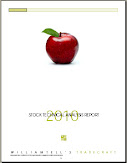Is it different this time they ask? This article is mainly what I have been writing about since April, 2010 and believing since 2001. This just kind of creeps up on you until you end up like the guy in Stephen Kings novel Creep Show as a pile of vegetated matter. The action governments need to take is devaluation of currency. The first one to bite it will likely cause a domino effect the scale and rapidity of such will make your head spin. Don't get lulled, by the almost making it back up in the market. Get your 401k your money out, and buy a farm or Rhodium.
Is It Different This Time?
AFP/Getty Images
- The U.S. Federal reserve building.
Sure, the various red flags could be wrong; it could be different this time. But the weight of probability is definitely on the downside.
The importance of the fiscal and monetary infusions following the credit crunch are becoming clear. The 11% deficit relative to GDP the U.S. government ran during 2009 managed to generate only around 2.5% GDP growth in the year to the end of the first quarter. This pales next to the rebounds that followed previous economic revivals.
Zero interest rates and quantitative easing worth around another two percentage points off the Fed funds rate have done all they can.
The current stimulus program is starting to wind down, so the net effect of new spending is tailing off. This has already become painfully apparent in the housing market, where the ending of buyer tax credits has seen housing sales numbers fall off a cliff to register even lower lows than anyone thought possible.
What’s more, it looks clear the inventory cycle rebuild is also beginning to run out of steam. And that’s important. Inventories generated around two-thirds of U.S. growth last year. By contrast, real final sales have been running at a mere 1.2%, the lowest for the year following the end of a recession in least 50 years, according to David Rosenberg of Gluskin Sheff.
Regional Federal Reserve bank surveys of business activity point to a slowdown, all during a period when employment growth seems to have stagnated.
No wonder longer-dated Treasury bond yields have tumbled, to where the curve is beginning to look uncannily like Japan’s did in the early stages of its lost decades–before, that is, the JGB curve turned completely flat.
As glum as the domestic picture looks, the international one is looking downright depressing. European austerity will not only limit U.S. exports to the region, but the euro zone will undoubtedly also look to the U.S. market to trade its way out of trouble. Meanwhile, the Chinese economy looks increasingly unhinged. Should its domestic real-estate bubble burst, you can expect China to look to ramping up its exports to the U.S. as a way of mitigating the pain.
John Hussman, of Hussman Funds, reckons the evidence suggests “the U.S. economy is most probably either in, or immediately entering, a second phase of contraction.”
Given the growing popular resistance to yet more fiscal stimulus–some policymakers are worried about triggering a sovereign-debt crisis in the U.S., while a vocal body of voters doesn’t want an even bigger government–the burden will fall on the Federal Reserve to get the U.S. economy out of trouble. Andrew Roberts, head of credit at Royal Bank of Scotland, figures the Fed will start a flood of QE.
History shows this seldom ends well. Kenneth Rogoff and Carmen Reinhart’s instant classic tome on debt crises, “This Time Is Different”, shows that banking defaults tend to be followed by sovereign defaults that tend to be followed by emergency monetary responses that result in uncontrolled inflation.
Paul Krugman warns that if governments don’t act, the global economy is heading towards its third serious depression of the past century and a half. And yet, if they act too much, they’ll destroy the very cornerstone of modern economies, government-issued currency.

















